

The flipping librarian. One of the things I am getting ready to do in September is to help a growing number of interested teachers flip.
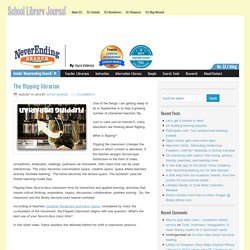
Just in case you’ve missed it, many educators are thinking about flipping. What is flipping? Flipping the Library: Tips from Three Pros. Through the use of innovative technologies and online resources, school libraries can now be available to students wherever—and whenever—they need them.
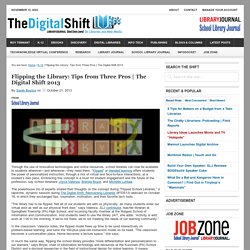
“Flipped” or blended learning offers students the power of personalized instruction, through a mix of virtual and face-to-face interactions, at a student’s own pace. Embracing this concept is a must for student engagement and the future of the profession, say school librarians Joyce Valenza, Brenda Boyer, and Michelle Luhtala. The powerhouse trio of experts shared their thoughts on the concept during “Flipped School Libraries,” a rapid-fire, dynamic session during The Digital Shift: Reinventing Libraries (#TDS13) webcast on October 16, in which they exchanged tips, inspiration, motivation, and their favorite tech tools.
“The library has to be flipped. In the classroom, Valenza notes, the flipped model frees up time to be used interactively on problem-based learning, and turns the 100-plus-year-old instruction model on its head. MediaTeach. Collaboration and reflection. Proactivity and Reflection: Tools to Improve Collaborative ExperiencesMinnesota Media, 2004 Collaboration is the Holy Grail of librarianship.
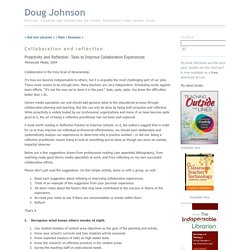
It’s how we become indispensable to others, but it is arguably the most challenging part of our jobs. There never seems to be enough time. Many teachers are very independent. Scheduling works against team efforts. Introduction. 1.

Students learn isolated skills and knowledge, starting with the simple building blocks of a particular topic and then building to more complex ideas. While this appeals to common sense (think of the efficiency of a automobile assembly line), the problem with this approach is the removal of any context to the learning, making deep understanding of the content less likely. Great Teaching Means Letting Go. Great Teaching Means Letting Go by Grant Wiggins, Ed.D, Authentic Education My greatest learning as a teacher came on the soccer field.
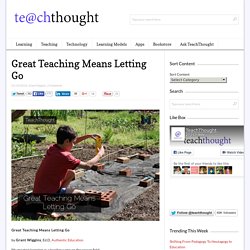
We had been working for a few weeks on the same key ‘moves’ on the field related to creating ‘space’. After a few practices, the team looked good in the drills – they’ve got it! Next two games? Today's%20school%20library%20media%20leader_1.pdf. The School Library Media Specialist: Overview. The teacher librarian must be prepared for a wide variety of leadership roles in the learning community.
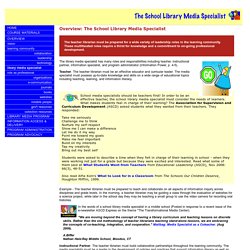
These multifaceted roles require a thirst for knowledge and a commitment to on-going professional development. The library media specialist has many roles and responsibilities including teacher, instructional partner, information specialist, and program administrator (Information Power, p. 4-5). Teacher. Learning Standards & Program Guidelines. Review and Revision For the first time in decades AASL will be using a multi-layered survey, data, and research approach to revise and rewrite its learning standards and program guidelines for your profession.
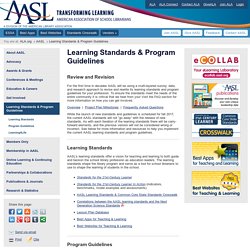
To ensure the standards meet the needs of the entire community it is critical that we hear from you! Visit the FAQ section for more information on how you can get involved. Learning Standards & Common Core State Standards Crosswalk. Skip to main content ALA User Menu Search form A Division of the American Library Association You are at: ALA.org » AASL » Learning Standards & Program Guidelines » Learning Standards & Common Core State Standards Crosswalk. Position Statement on Flexible Scheduling. The library program is fully integrated into the educational program so that students, teachers, and school librarians become partners in learning.
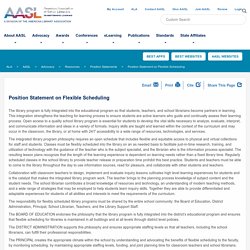
This integration strengthens the teaching for learning process to ensure students are active learners who guide and continually assess their learning process. Open access to a quality school library program is essential for students to develop the vital skills necessary to analyze, evaluate, interpret, and communicate information and ideas in a variety of formats. Inquiry skills are taught and learned within the context of the curriculum and may occur in the classroom, the library, or at home with 24/7 accessibility to a wide range of resources, technologies, and services. Thinkfinity.